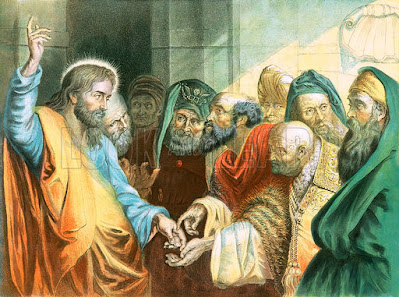TWENTY-NINTH SUNDAY
IN ORDINARY TIME
21-22 October – Holy Spirit Parish
Is 45:1, 4-6
1 Thes 1:1-5b
Mt
22:15-21
Praised be Jesus
Christ!
“Thus says the Lord to his anointed,
Cyrus… It is I who arm you, though you know me not, so
that toward the rising and the setting of the sun people may know that there is
none besides me. I am the Lord, there is no other.”
Big Cyrus, the
pagan conqueror, who lets Israel return to the Promised Land, without them lifting
a finger, after 70 years in Babylonian captivity. The prophet Isaiah tells us
that this was God’s doing. It is I who arm you,
though you know me not, so that toward the rising and the setting of the sun
people may know that there is none besides me. Cyrus was God’s chosen
instrument to restore Israel to its home. Over the course of time it has never
proved easy for people, even people of faith, to grasp that our God does indeed
rule the universe and guide the course of history. Not an easy truth, but a
truth just the same: God, the Father of our Lord Jesus Christ rules the
universe. If we could always and everywhere profess that truth we would not
live so anxiously, burdens would be easier to carry, and we just might live
more consistently in hope.
In the Gospel of
Matthew today, the Pharisees would seem to give the impression that they are in
charge of their people’s fate. “Is it lawful to pay the census tax to Caesar
or not?” Their “us-against-the-world”
attitude, so to speak, is a good part of what got the Pharisees to hold to the letter
of the law and simply insist on keeping the conquering Romans at arm’s length,
as if it were unthinkable to grant the Romans a place in God’s plan for His
people Israel, to recognize the oppressor’s place in determining the fate of
the people not only for bad but also for good. When asked to declare Himself
for one party or the other, to choose between the Romans and the observance of
the Law, Jesus confounds the Pharisees in His response to their challenge by speaking
to the reality of Israel’s situation of subjection to Rome. “Then repay to Caesar what belongs to Caesar and to God
what belongs to God.”
As evident or
obvious as Jesus’ response was, it was for the Pharisees and is in similar
situations in our world a case of thinking outside the box. Most people are
immediate and political in their approach to life. In living just for the
present moment not many people actually grapple with the big questions in life,
at least not with those dealing with the power and presence of God in our world.
Our attitude seems to be one more inspired by the workings of politics or of
the debate platform, and hence motivated by the quest for short-term gains. In
the light of this Sunday’s readings, I think we should rather focus on the role
of divine providence in our lives, about God’s will being done in all things
despite the impression we might have that He the Lord is seemingly absent from
the bigger picture.
I don’t think
there is a day which goes by in a social setting when someone doesn’t complain to
me about either people in civil government or in church government. They let
their nerves get frayed over things beyond their control. This situation on the
southern border or that comment by some politician has them all up in arms,
filled with disgust, and really at their wit’s ends. Very few of them seem to
take consolation from the suggestion that it might be better to spend much less
time following the news.
The phrase “Then
repay to Caesar what belongs to Caesar and to God what belongs to God” is
not calculating and does not represent a political stance, but it does speak to
the reality of things. From little on, we are taught to pray for rain in due season
and to pray for a bountiful harvest. It makes sense in that these are things
beyond our control. The longer I live in this world of ours, the clearer it
becomes to me that praying the Lord to grant wisdom and grace to our leaders is
a no less worthwhile prayer intention. The more disinformation we encounter out
there in the world the more sense it makes to beg the Lord to place His mighty
Hand on all those who wield the scepter of power in our world.
It is I who arm
you, though you know me not, so that toward the rising and the setting of the
sun people may know that there is none besides me.
Pray for the
peace of Jerusalem, as the psalmist says. May those who love you prosper!
PROPERANTES ADVENTUM DIEI DEI



